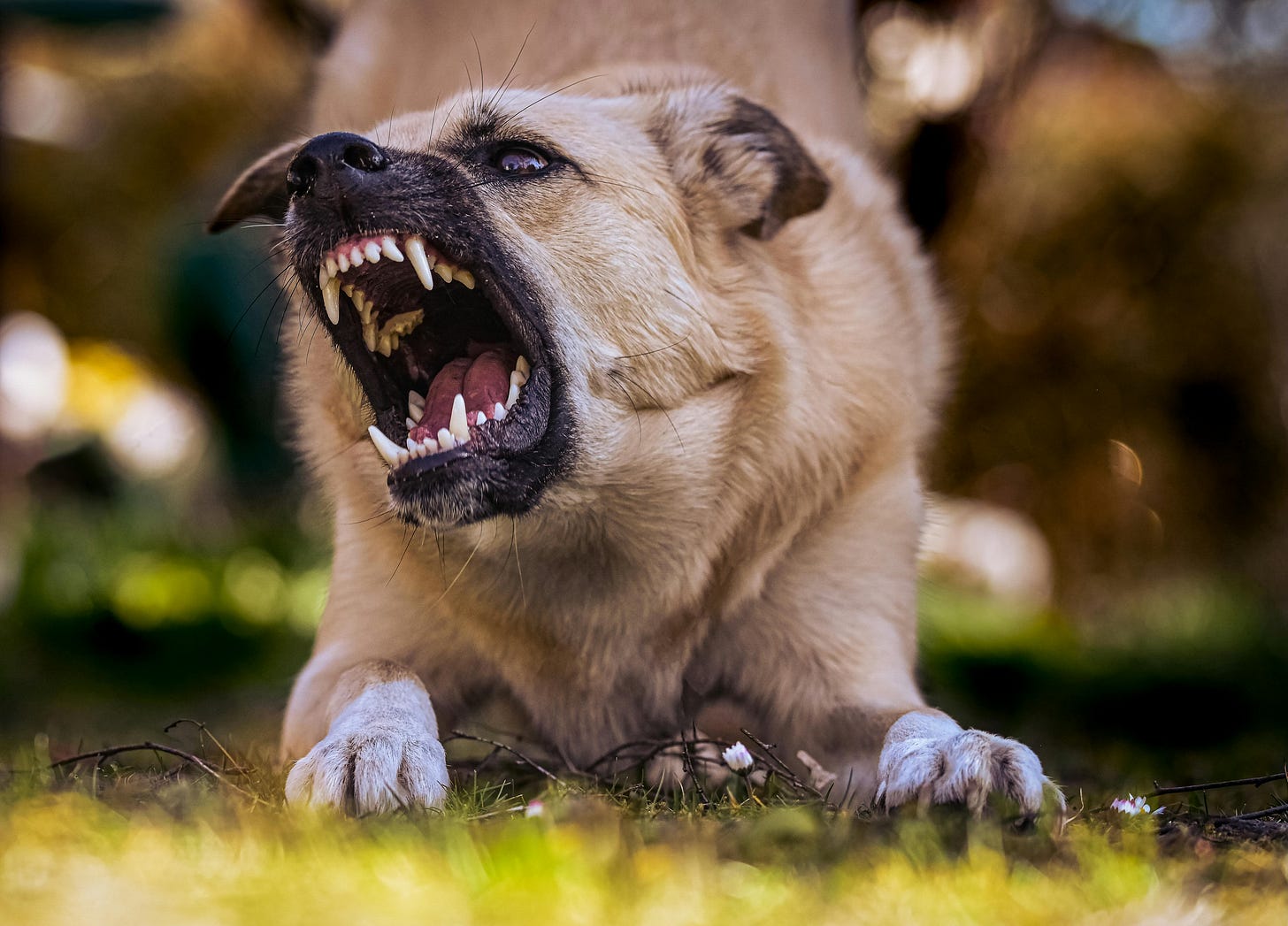Every summer when I was a kid our family spent time in a quiet corner of Maine, and one year I remember there being this dog. I never saw it myself, but I sure heard about it: a mean dog that my dad sometimes passed on a back road while jogging. The dog would growl and bare its teeth and bark violently and start after him. My dad – solo, on a lonely dirt road – would pick up a few rocks and toss one in the vicinity of the snarling animal to keep it at bay… and to demonstrate what it might expect if it gave chase.
We’re dog-owners and -lovers in my family – very fond of our Rovers and our Spots… and yet, the fact is, there are mean and dangerous dogs out there. We’ve all encountered them; you probably have your own story.
When I hear the term “vicious,” I always thinks of dogs like this – snarling, snapping, biting, mad. A dog that attacks a person, unprovoked, is a vicious dog.
But vicious isn’t actually a word about a snarling dog, or really about animals at all. Nope. What if I told you that “vicious” is a descriptor of people and not animals, and it’s more about character than behavior?
The word vicious comes from the word “vice,” not a word we use much anymore. And vicious means, quite simply, “vice-filled.”
OK then. So what’s a vice? A vice is an attitude a person develops when she carries out actions aimed at the bad. When you do things that go against the basic goods (life, knowledge, friendship, beauty, play, practical reasonableness), you develop a vice. And when you have bad intentions and act on them, you’re not only left with the result of the action, but also its side effect. The mark left within you when you do bad things is the vice.
Meanness is a vice. So is impatience, and laziness. Cowardice is a vice.
So what about when you take actions pointed at good things, at the basic goods? What happens then? Well that creates a virtue, as a byproduct. It’s the mark left within you when you do a good thing. A virtue is the side effect that happens in your character when you pursue the good.
Vices and virtues, then, both are formed within humans when they pursue bad and good things (respectively), and needless to say, they’re opposites.
Let’s look at how a virtue plays out in real life: we’ll do an example.
Start with the good of beauty. You want to bring beauty into your life, so you learn to play an instrument or to paint portraits. Any action taken to promote a good is reasonable (literally, “reason-filled”). As you practice your violin or improve your brushstrokes, over time you develop diligence in your task and patience to endure the many iterations necessary to move toward beauty. Diligence and patience are virtues.
Now we’ll do a vice in the same scenario. You don’t want beauty in your life or care to take steps to achieve it, so when you get to your music or art lesson you dawdle, rush through playing or drawing, or shirk your homework. If you do this continually, you will grow in laziness, impatience, or carelessness. These are vices.
Virtues that grow in us as we act for the good and vices that grow in us when we act in opposition to the good are reinforced by habit. You don’t start out diligent the first time you do your piano practice, but fifty times later you’ve become diligent. And you might not start out lazy the first time you skip your practice, but after you’ve shirked it fifty times you’ve become lazy.
What does it all add up to? A person whose life is characterized by virtues is also a person whose life is pointed at goods; that person, over the course of his life, flourishes. But the life of a person who’s characterized by vices is pointed at that bad; he ultimately doesn’t thrive over time. He flounders. We know this from natural law.
So back to vice.
We all have vices in some areas of our life, because we’re human. We all act with bad intentions some of the time. The question is how pervasive is the vice in us, and do we care? If you’re an impatient person, how impatient are you… and are you becoming more or less patient? Say, compared to this time last year. What steps are you taking to move the dial toward patience? Moving the dial toward virtue isn’t just modifying habits but proactively elevating the basic goods in our lives and pursuing them. It’s about what you intend and who you’re becoming over time.
But vice + vice + vice + vice = viciousness. And vicious people have taken actions against the good repeatedly over time. They aren’t interested in limiting their vices or turning them into virtues. They like the bad (or at least what’s “in it for them” in the bad)… and they carry on acting toward bad ends, one leading to another, with no plan to stop. They eventually become shot through with vice. This is the quintessential hateable villain of the movie you just watched. Or, our go-to modern example, Adolf Hitler. Thoroughly vicious people. Not role models of any kind; no goodness, truth, or beauty to speak of.
Takeaway: seize hold of virtue over vice any day! Love virtue, pursue it, and flourish. And to that end: it’s generally far better to encounter a mean dog on a back road (especially if you have a rock nearby) than to get entangled with a vicious person. If that’s not a proverb somewhere, maybe it should be!





I'll be using this info too when I teach at my church later this fall! Of course, this is not the first time you will be quoted at my church. Thank you.
Well said!